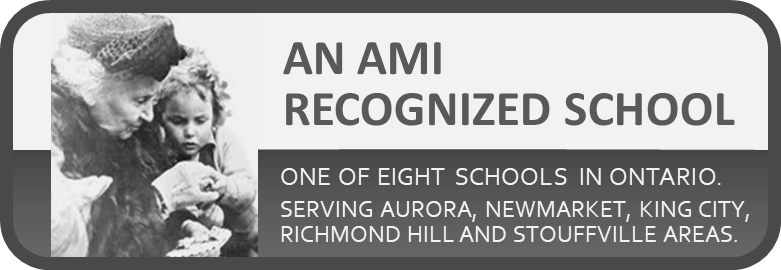
We are An AMI Recognized School and are committed to the principles of the Association Montessori Internationale (AMI). Our Directress and staff are AMI trained and have over 30 years of combined Montessori experience.
Our casa program follows authentic Montessori curriculum mixed with frequent field trips to the local library, bank and other shops that complement learning by allowing the children to see practical applications of what they learn. The right mix of classroom activities and field trips enables us to cultivate a keen interest in academic subjects while providing ample opportunities for children to expand their general knowledge and social skills.
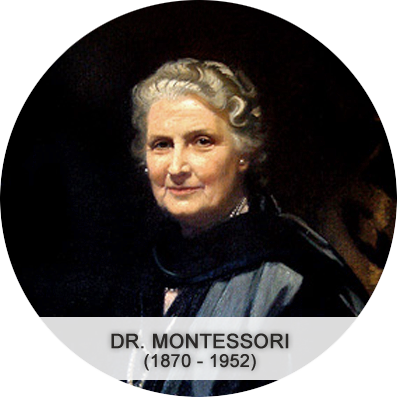
Introduced originally by Dr. Maria Montessori over a hundred years ago, the Montessori method complements children’s own ability to learn through sensorial exploration and self-discovery. Fundamental to Montessori approach is acknowledging and giving great respect for the child as an individual. Each activity in the classroom is purposefully designed for the child to explore and learn independently. In a Montessori classroom, the teachers merely direct the child and, therefore, are called directresses and not teachers. This natural and independent learning through self-discovery provides the foundation for holistic development – i.e. the development of intellectual, physical, emotional, social and spiritual areas altogether for enabling our children to become well-balanced individuals.
The Montessori curriculum and, therefore, the classroom is purposefully organized into five sections. While each section is independent, the purpose and the organization of the materials as well as the learning concepts are often intertwined with one another. The materials on each section of the classroom are 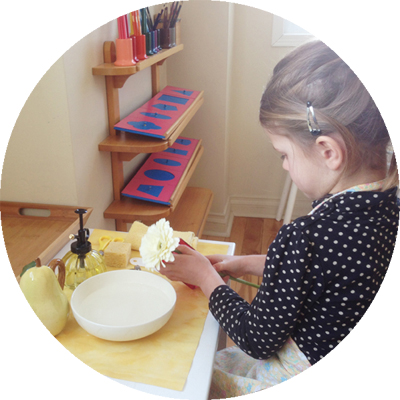 subtly organized in a left to right fashion, progressing from easier ones on the left to the more challenging ones on the right as an indirect preparation for reading (left to right).
subtly organized in a left to right fashion, progressing from easier ones on the left to the more challenging ones on the right as an indirect preparation for reading (left to right).
Practical life activities focus on four main areas – control of movement, care of self, others and the environment, and grace and courtesy. They are the distillation of everyday activities the child experiences at home and in the classroom. These simple everyday activities are presented like a celebration of life since for a child they are complex and intriguing. The practical life activities involve the children in precise movements which challenge them to concentrate and work uninterrupted to complete the activity, which provides them the feeling of satisfaction and builds confidence. These activities are designed to develop fine motor and other skills needed to advance to the more complex Montessori activities.
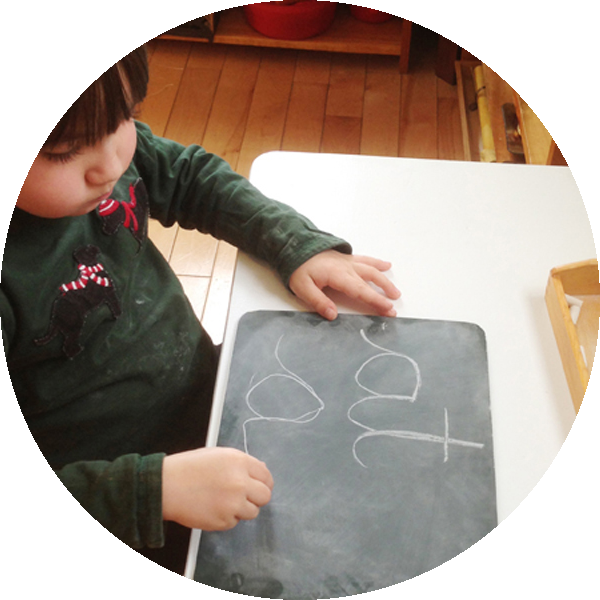
Sensorial activities bring clarity to the mind by helping the child sort, arrange and classify their day-to-day experiences. Abstract concepts of time, imagination, numbers, weight, etc. are unfathomable for a child and the objective of these exercises is to form the basis for abstraction in thought. Each sensorial activity, therefore, aims to enable a child to isolate a fundamental quality perceived through the five senses such as color, smell, texture, taste, sound, shapes, dimension, temperature, weight, etc. Advancing then to allow the child to differentiate specific qualities such as loud/soft, long/short, rough/smooth, circle, square, cube, etc. to make the world even more meaningful to the child.
Language, as with other concepts, is introduced through concrete sensorial materials. To encourage creativity and self expression, children are taught to write first and then read since writing is one’s own thought. Alphabets are introduced through meaningful games and tracing letters, then progressing to small phonetic words and eventually to complex words and sentences. The enrichment of language and vocabulary in the classroom happens with the use of good language, meaningful conversations, poetry, storytelling and encouragement for voicing opinions and purposeful talk. Advanced grammar work such as parts of speech and sentence analysis are a part of the curriculum for older children.
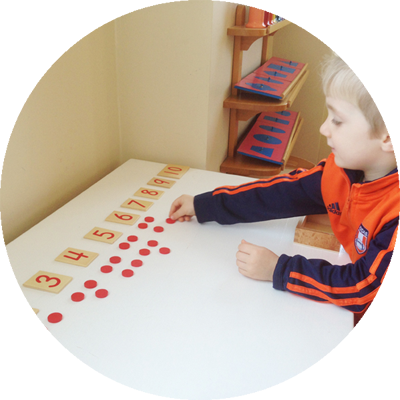
Math in a Montessori classroom is also a very sensorial experience, making it interesting, meaningful and understandable for children. All abstract math concepts – addition, subtraction, division and multiplication – are first learnt through the manipulation of concrete materials. For eg., the child initially counts with the help of beads, then numerals on cards and then progresses to abstract math exercises that requires the child to associate the numerals abstractly in his mind without needing either beads or cards. The presentations are sequentially layered to make the foundation for math solid thereby paving way for abstract reasoning, critical thinking and problem solving capabilities.
Culture is presented as extensions of the four areas listed above and covers topics such as Geography, Biology, Botany, Zoology, Art, Music, Dance and Physical Education. Children learn about people and cultures around the world and the lessons related to geography, nature, and other forms of life connect the children to our world and the global community. The aim here is to inspire the child to respect all human beings, other forms of life, nature and make them environmentally conscientious. Art, music, poetry, etc. allows the child to enjoy and explore a variety of creative activities.
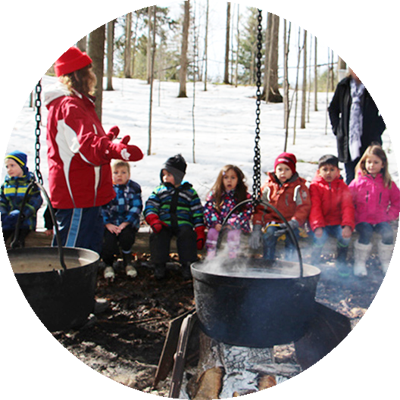
Montessori curriculum coupled with our field-trips enables us to provide the right foundation for our children to become well balanced individuals. Our short field trips are beyond traditional, planned visits to orchards and farms. Utilizing our proximity to the library, cultural center, bank, post office, hardware shop, and many other local businesses, we organize frequent short field-trips and volunteer activities to provide our children ample exposure to real-life situations for cultivating interest in academic subjects as well as expanding their general knowledge and social skills.
These field trips are informal and are carried out as part of our normal school day activity during the day, often with just one or two children accompanied by an adult. Children are encouraged to make a list of what to buy, converse with the sales clerk, deal with cash to pay at the check-out, etc. In addition to experiencing what they learn at school, these trips make children aware of the purpose of these institutions and how they really function. All children are given ample opportunities for these field trips throughout the year.
